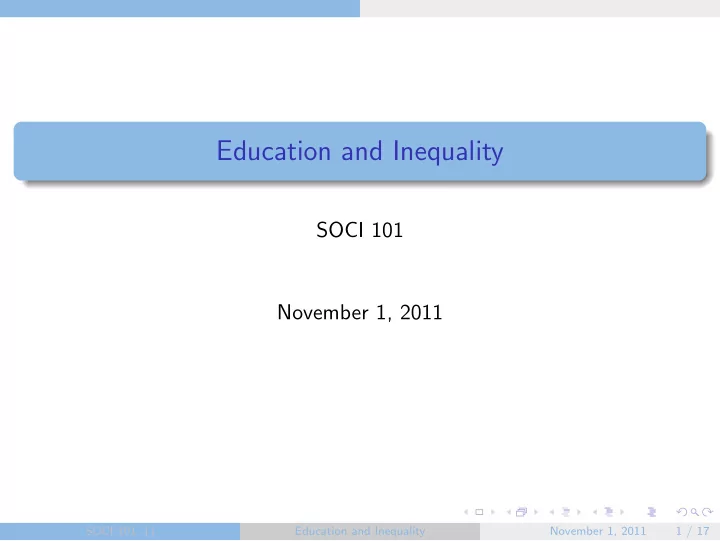

Education and Inequality SOCI 101 November 1, 2011 SOCI 101 () Education and Inequality November 1, 2011 1 / 17
Inequality in America Father’s occupation predicts son’s occupation Mobility: the ability of a child to achieve a different status than his/her parent(s) Mobility is one way of assessing the fairness of a society Life Chances : how much is based on inherent talent, environmental differences, achieved success, and social safety net? SOCI 101 () Education and Inequality November 1, 2011 2 / 17
Comparative Inequality % bottom % top % top % bottom Country → top → top % → bottom → bottom USA 7.9 36 9.5 42.2 Nordics ∼ 11 ∼ 35 ∼ 15 ∼ 26 UK 12.2 29.7 10.7 30.3 Jantti et al., “American Exceptionalism in a New Light.” IZA Discussion Paper 1938, January, 2006. http://papers.ssrn.com/sol3/papers.cfm?abstract_id=878675 SOCI 101 () Education and Inequality November 1, 2011 3 / 17
Education in America Primary means for equalizing opportunity Primary means for legitimizing inequality Primary means for reproducing inequality SOCI 101 () Education and Inequality November 1, 2011 4 / 17
Education in America Segregation Legally-enforced racial separation by school Systematic inequality in educational quality Brown v. Board , 1954, outlaws segregation SOCI 101 () Education and Inequality November 1, 2011 5 / 17
Desegregation: Why Busing? Residential segregation by race and class Preferences for racial makeup are unstable Local control and funding Policies and resistances SOCI 101 () Education and Inequality November 1, 2011 6 / 17
Education in America Desegregation SOCI 101 () Education and Inequality November 1, 2011 7 / 17
Education in America Desegregation SOCI 101 () Education and Inequality November 1, 2011 8 / 17
Local Control and Funding Principal funding source: property taxes Property values change in part with school quality Wealthy communities, wealthy schools State funding mitigates this somewhat SOCI 101 () Education and Inequality November 1, 2011 9 / 17
Local Control and Funding No Child Left Behind National standards for school success Standardized testing, sub-population improvement rates Underperforming schools punished financially SOCI 101 () Education and Inequality November 1, 2011 10 / 17
Sociology of Education Willis, Learning to Labor 1970s England Why do working class kids end up in working class jobs? Development of oppositional culture Teachers and administrators use class to label kids SOCI 101 () Education and Inequality November 1, 2011 11 / 17
Sociology of Education Conley, Being Black, Living in the Red What explains persistent black-white gaps? Not just education but income, job status, etc. Consider class as wealth, not income On most measures, African Americans outperform whites after accounting for family wealth SOCI 101 () Education and Inequality November 1, 2011 12 / 17
Sociology of Education Lareau, Unequal Childhoods Philadelphia area families Some working-class, some middle-class How do they interact with school and teachers? “Concerted Cultivation” vs. “Natural Growth” SOCI 101 () Education and Inequality November 1, 2011 13 / 17
Sociology of Education Grant, Hope and Despair in the American City Comparison: Syracuse, NY / Raleigh, NC Syracuse: City district, suburbs separate Raleigh: County district Incentives for quality across school districts SOCI 101 () Education and Inequality November 1, 2011 14 / 17
How Race and Class Might Influence Education Access to quality educaton Access to “extras” (computers, work spaces, etc.) Family cultural differences in approach to education Friend-network cultural differences in approach to education Educator bias . . . SOCI 101 () Education and Inequality November 1, 2011 15 / 17
The Big Picture: Intellectual Habits of Mind SOCI 101 () Education and Inequality November 1, 2011 16 / 17
Epilogue: The Public University SOCI 101 () Education and Inequality November 1, 2011 17 / 17
Recommend
More recommend